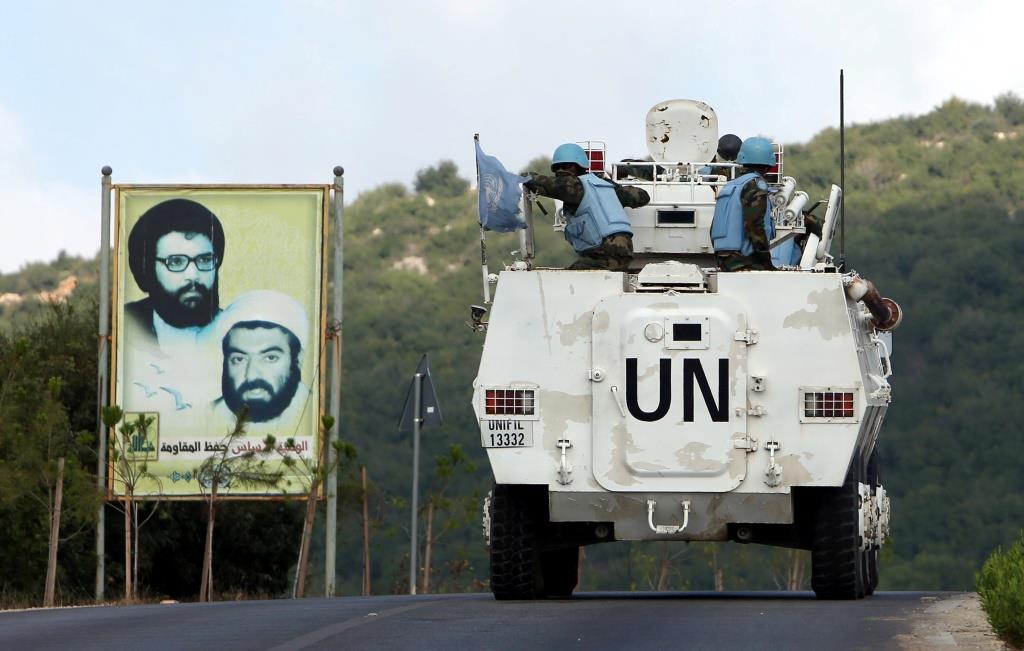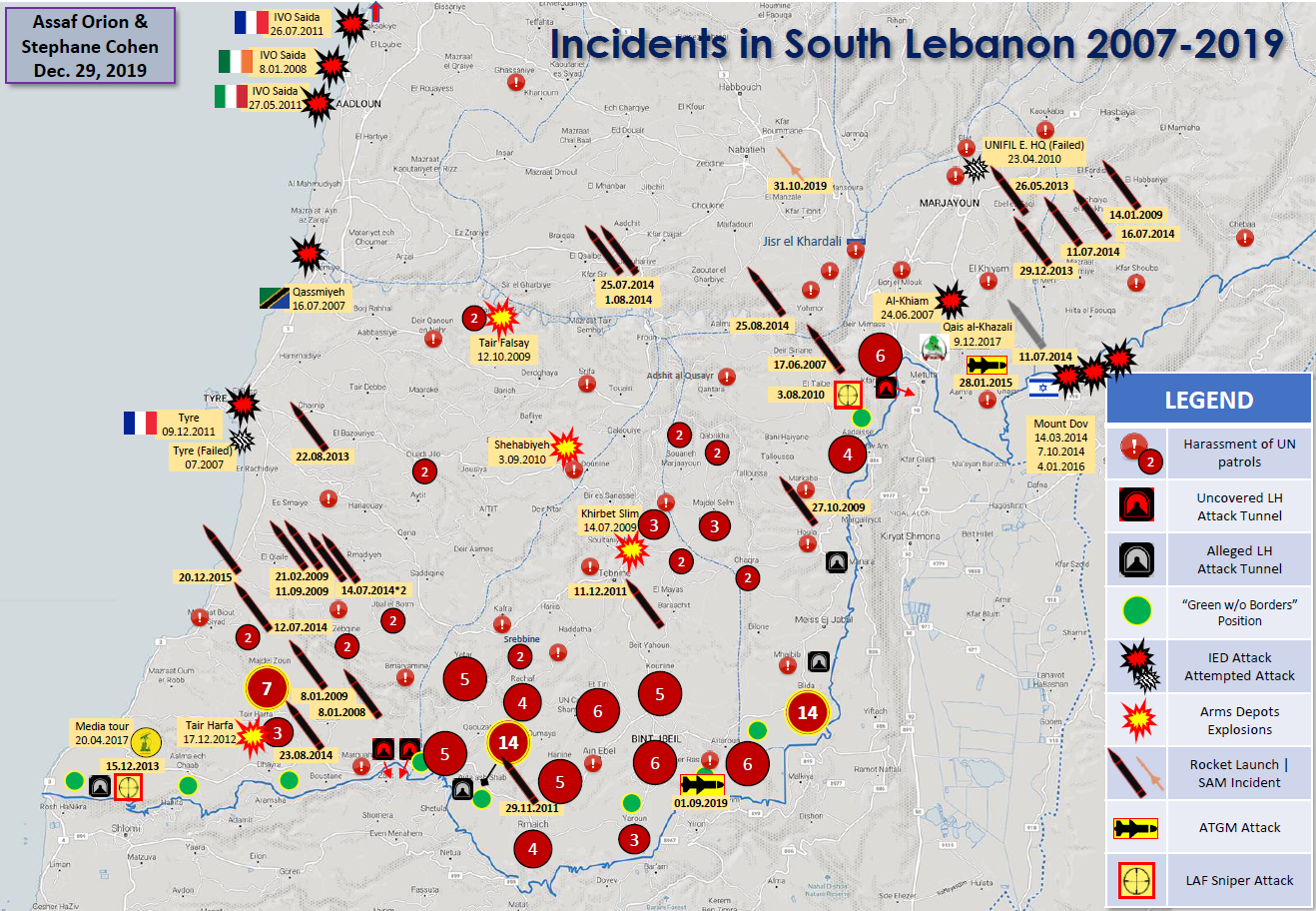Publications
INSS Insight No. 1242, January 5, 2020

The UN Security Council recently published its periodic report on Resolution 1701 (2006). Against the backdrop of severe security incidents and political challenges in Lebanon, and alongside traditional formulations, there are some salient new elements in this report: extensive and relatively detailed attention to the restriction on freedom of movement and access of UNIFIL forces in South Lebanon; exposure of the active role played by the Lebanese government and military in violating 1701 and impeding the implementation of the UN force’s mandate; Lebanon’s neglect of its obligation as a host country to protect UNIFIL soldiers from harassment and harm; and some features of the campaign conducted by Hezbollah to paralyze and blind UNIFIL: the operational role of the ”environmental organization” Green Without Borders in the service of Hezbollah, and the sweeping use by all elements in Lebanon of “private property” as grounds for blocking illicit military sites to UNIFIL. The details of the report, together with the political-economic crisis in Lebanon, are an important opportunity for Israel to review its policy regarding Lebanon and for other countries to do the same.
On November 18, 2019 the UN Secretary General published the Periodic Report on Security Council Resolution 1701 (2006) for the period June 25-October 31, 2019. The report gives a detailed account of security events, from the drone attack on Beirut on August 25, which was reportedly attributed to Israel and directed at Hezbollah’s precision missile project; continuing with the Hezbollah counter-attack by three anti-tank missiles fired at an IDF vehicle on September 1 and the IDF shelling in response; and the protests throughout Lebanon that began on October 17, with the ensuing political crisis still in the making.
In fact, given the severity of these outstanding events, on the brink of military escalation and the historic economic-political crisis in Lebanon, it is particularly noteworthy that the report stresses not only the violations of 1701, but also the role of Lebanon’s government and armed forces in impeding UNIFIL’s missions, in actual violations, cover-ups, and preventing justice from being brought upon those who harass UN forces in Lebanon. For the first time the report devotes an appendix to illicit weapons, and specifies fourteen specific incidents of restricting UNIFIL’s freedom of movement (compared to six in the previous report), in which UNIFIL forces were stopped by “locals,” sometimes violently, with the familiar features of the ongoing Hezbollah campaign against UNIFIL. UN sources said that the rise in reported incidents reflects both growing aggression against UNIFIL on the ground, together with increased reporting by the UN, and others stressed the efforts invested in improving the quality of reporting and the level of detail. In geographical terms, most incidents were in the central sector, where the village of Blida is a clear center for harassment of UNIFIL, with four incidents in recent months, and a total of 14 incidents reported by the UN since 2006. Green Without Borders, purportedly an environmental organization, commands much attention in the report: anti-tank missiles were fired from near its positions next to Maroun al-Ras; its positions are explicitly described as sites where UN access is limited; and its operatives block UNIFIL soldiers and patrols actively and with growing frequency.
In addition to harassment on the ground, the report stresses the role of the Lebanese President and senior army commanders in preventing UNIFIL access to sites of violations. Alongside familiar wording that creates a misleading impression of effective presence in the entire area - “UNIFIL vehicle, foot and air patrols maintained an operational footprint in all municipalities and villages in the area of operations” - the report specifically states that “the Lebanese Armed Forces objected to some patrol routes proposed by UNIFIL in order to expand its presence in areas outside main routes and municipal centres, on the grounds that these either were private roads or involved areas of strategic importance to the Lebanese Armed Forces.” Thus the Lebanese government and army continue resolutely to deny UNIFIL access to any site, area, or road segment defined as “private property,” including Green Without Borders positions, sites of recent missile launches, and the sites of the openings of Hezbollah attack tunnels exposed in Operation Northern Shield a year ago, among them areas that UNIFIL had patrolled in the past without interference. In addition, “air reconnaissance patrols continued over areas to which ground patrols had limited access, including private property” (emphasis added). Senior figures at UN headquarters recognize the clear and growing use by all elements in Lebanon of the “private property” pretext to hide Hezbollah’s military deployment and to deny UNIFIL access to them, but debate how best to deal with this problem, when Lebanon hides behind its laws and sovereignty in order to continue to skirt its international obligations. The report highlights Lebanon’s foot-dragging and lack of credibility in bringing the attackers of a UN patrol in Majdel Zoun in August 2018 to justice, and cites many other attacks on UN forces in Lebanon where legal proceedings have procrastinated.
For the familiar sake of balance, the report cites Israeli violations, particularly in the air, in weapons pointing, the occupation of northern Ghajar, and a few crossings of the Blue Line northward, one of them through the Mandate period railway tunnel at Rosh Hanikra.
Resolution 1701 authors saw the presence of Hezbollah weapons close to the Israeli border and beyond the authority of Lebanon as the main cause of the outbreak of war in 2006, and sought to avoid another war by preventing these same conditions. Their approach was that the army of the sovereign Lebanese government, aided by UNIFIL, was the answer to the threat of non-state weapons. However, the campaigned harassment of UN forces in southern Lebanon, two incidents of anti-tank missiles launches, the excavation of attack tunnels into Israeli territory for over a decade, dozens of rocket incidents, four arms depots that exploded, and almost ten explosive device attacks against UNIFIL and the IDF demonstrate the diverse abundance of Hezbollah's military presence in southern Lebanon, and its ability to employ it at will. Contrary to the report’s claim that “UNIFIL continued to assist the Lebanese Armed Forces in establishing an area between the Blue Line and the Litani River free of unauthorized armed personnel, assets and weapons other than those belonging to the Government of Lebanon and to UNIFIL,” it is blatantly clear that the Lebanese army does nothing against Hezbollah’s massive military deployment in southern Lebanon, and subsequently, UNIFIL is unable to help it do so.
Notwithstanding the blessing of security calm, it is important to recognize four main policy failures of Israel and its partners in the West vis-à-vis Lebanon: the growing military power of Hezbollah in southern Lebanon; Hezbollah’s takeover of Lebanon's political system and neutralization of other power elements; the enthusiastic cooperation with Hezbollah among (at least parts) of the Lebanese Armed Forces; and above all, as indicated by the new US Ambassador to Lebanon this past month, the continued auto-pilot pursuit by the international community of policies formulated in 2005-2006, in spite of the deep changes in the reality since and the collapse of their underlying assumptions. Western diplomats have indeed shown understanding of Israel’s concern at the growing military strength of Hezbollah and its precision missile project. However, their paramount priority is the stability of Lebanon, and their policy focus is on reinforcing government institutions, above all the Lebanese army; leaving the Lebanese government room for maneuver, even though it is controlled by Hezbollah; suppressing the growing security risk; and fostering hopes of a better future. Israel, on the other hand, has difficulty presenting an effective policy that will be accepted by its Western partners, mostly France, and its warnings of escalation are received as warmongering on its part. Israel’s pressure to stop American aid to the Lebanese army until it takes action against Hezbollah’s precision missile factories gained fleeting support from the White House, but met with opposition from the policy establishment in the United States, from the Pentagon through the State Department to Capitol Hill. Israel's messages of deterrence against Lebanon and its infrastructures perhaps encourage Hezbollah’s considerations of self restraint, but it cannot be assumed that they will prompt other elements in Lebanon that are under Hezbollah's yoke to try to restrain it, and they are certainly not well received by the international community.
In the limited context of UNIFIL and Resolution 1701, Israel must utilize their full positive potential in a differential, graduated, and systematic fashion. Ongoing efforts should be directed at the date of the annual renewal of the mandate at the end of August, and until then Israel should act on a number of levels, both on the ground, at UN headquarters, and with friendly states. First, it should strengthen the liaison and coordination mechanisms, and above all the tripartite meetings between UNIFIL, the IDF, and the LAF, as a means to prevent escalation. Second, it should strive to improve the credible depiction of the actual situation in UN reports, by improving visual and geographical documentation of UN activity: equipping patrols with body cameras, detailing activity along actual patrol routes, guaranteeing full documentation of incidents with Hezbollah activists, including facial recognition and identification of license plates of vehicles involved, and stressing the part played by the Lebanese government in violations of 1701 and the UNIFIL mandate. Third, the Lebanese government must be demanded to stop its impediments of UNIFIL and its cover-up of Hezbollah violations. Fourth, UNIFIL must demand immediate access to all the tunnels and other relevant sites, a full and detailed response to all incidents against UNIFIL, the end of legal foot-dragging surrounding former attacks on UNIFIL, and the removal of the “private property” pretext as a thinly veiled cover for banned Hezbollah activity.
In addition, Israel should promote a distinction between the elements of the Lebanese military that cooperate with Hezbollah, which should be defined as supporting terror, and the parts that are an important component in promoting Lebanon’s stability. In view of its operational role in the service of Hezbollah, the Green without Borders group should be defined as a terrorist organization, subject to international sanctions. There should be an effort to promote a special security regime, with extended powers for UNIFIL, in the strip of land north of the Blue Line, with the emphasis on the central sector. Unless there is any progress along these lines, it is important to renew the demand to downsize the UNIFIL force and cut its budget in accordance with its actual authority and freedom of activity, which are currently severely limited by the host Lebanese government, whose strength is in its weakness.
Taking a broader view, the current reality entails threats and opportunities for Israel. In view of the explosive potential, is important to put the main emphasis on avoiding escalation to war. Because of the severity of the precision missile threat, Israel must continue to counter it throughout the region, including in Lebanon, in the framework of its “campaign between wars,” while making a supreme effort to keep it below the threshold of escalation. Israel should encourage its Western partners to review their policy toward Lebanon, based on developments over the past decade. The economic-political crisis in Lebanon reinforces the state’s dependence on external aid, which can be made conditional on significant progress not only in areas that top the international agenda (reforms, corruption, governance, and political-economic stability) but also in the field of security, which is essential for Israel. The economic crisis likewise reinforces the value to Lebanon of a possible agreement regarding Mediterranean gas, which could be the first step toward a gradual economic-security settlement. For some time Israel has been working for a limited arrangement with another terror organization and bitter enemy, Hamas in Gaza. It should bring this conceptual flexibility to bear with respect to Hezbollah as well, since the cost of war with it would be far higher.



